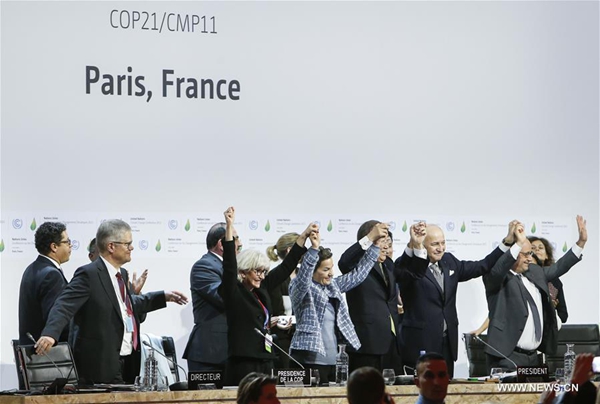Did Paris accomplish the mission to save the planet?
- By Zhang Jingwei
 0 Comment(s)
0 Comment(s) Print
Print E-mail China.org.cn, December 15, 2015
E-mail China.org.cn, December 15, 2015
|
|
|
French Foreign Minister and President of the COP21 Laurent Fabius (3rd R), United Nations Secretary-General Ban Ki-moon (4th R), French President Francois Hollande (2nd R) and Christiana Figueres (5th R), executive secretary of the UN Framework Convention on Climate Change (UNFCCC) celebrate the adoption of the agreement during the final conference at the COP21, in Le Bourget, Paris, Dec.12, 2015. [Photo: Xinhua] |
After negotiations lasting twelve days, the UN climate change conference came to a conclusion in Paris. On December 12, nearly 200 countries adopted a new global climate deal which addresses their related actions after 2020.
In the wake of the terrorist attacks in Paris, a successful accord was needed to boost morale in France. World leaders also came to Paris with the expectation of reaching a deal. The leaders of China and the United States -- the two largest carbon emitting countries in the world -- released joint statements on climate change twice this year and last year. Just before the conclusion of the conference, U.S. President Barack Obama called on his counterparts in emerging countries such as China, Brazil and India, in the hope of narrowing down differences and reaching a consensus.
The result of the conference has also been satisfactory. Some have described the deal as the last chance to save mankind. It may sound like hyperbole, but it does accurately capture the world's expectation on tackling climate issues. In the age of the "global village," people realize that their common living space is not wide enough and that saving the planet means saving their own living space.
But the world has developed unevenly and binding standards as well as roadmaps are needed when it comes to energy conservation and emissions reduction. The principle of "common but differentiated responsibilities" was laid out in 1992 and the Kyoto Protocol was signed in 1997. Later, the U.S. and Canada turned their back on the Protocol, leading to a stalemate in global climate negotiations. And as carbon emissions from the emerging markets have increased, developed countries would like to see more responsibilities shared by developing countries. Meanwhile, developing countries have asked their developed peers to offer more money in assistance to help them adopt cleaner energy.
With twists and turns, the post-2020 roadmap for global energy-conservation and emissions reduction has become rather chaotic. Thanks to the efforts of China, the U.S., France and other developing countries in advance of the global meeting, a legally binding deal was eventually reached in Paris.






